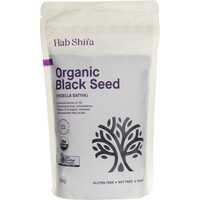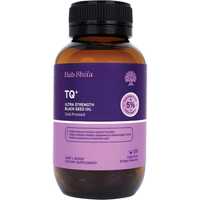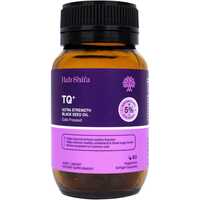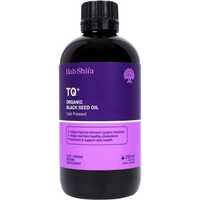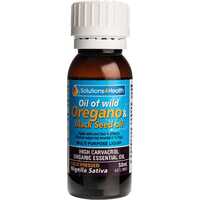Black seed oil, derived from the Nigella sativa plant, has been revered for centuries due to its remarkable health-promoting properties. This ancient remedy is now gaining recognition in the modern world for its potential to support optimal well-being and address various health concerns. Black seed oil benefits are wide-ranging, making it a valuable addition to any natural health regimen.
In this article, we will explore the nutritional profile of black seed oil and delve into its numerous health benefits, including its potential to boost the immune system, manage diabetes, support cancer prevention, promote heart health, alleviate arthritis symptoms, ease asthma, protect the liver, and combat inflammation. Additionally, we will discuss how black seed oil can be used to enhance skin and hair health and provide practical tips for incorporating it into daily life. Finally, we will address potential side effects and precautions to ensure safe usage.
Nutritional Benefits of Black Seed Oil
Black seed oil is a nutritional powerhouse, packed with a wide array of essential nutrients that contribute to its remarkable health benefits. The maximal nutritional value of black seed can be attributed to its substantial content of vegetable protein, fibre, minerals, and vitamins [7] [8].
The nutritional composition of black seed varies depending on the source, but it typically contains 20-85% protein, 38.20% fat, 7-94% fibre, and 31.94% total carbohydrates [7] [8]. Among the various amino acids identified in black seed, glutamate, arginine, and aspartate are the major ones, while cysteine and methionine are present in smaller quantities [7] [8]. Black seed is also a rich source of essential minerals such as iron, copper, zinc, phosphorus, calcium, and vitamins including thiamin, niacin, pyridoxine, and folic acid [7] [8].
Rich in Essential Nutrients
Black seed oil contains a wealth of essential nutrients that are vital for optimal health. The oil is particularly rich in unsaturated fatty acids, with linoleic acid (57.71%) and oleic acid (24.46%) being the predominant ones [9]. These healthy fats play a crucial role in maintaining cardiovascular health, reducing inflammation, and supporting brain function [9].
Additionally, black seed oil is an excellent source of tocopherols, with a total content of 282.63 mg/100g oil [9]. Tocopherols, especially γ-tocopherol (242.83 mg/100g oil), are powerful antioxidants that protect cells from oxidative damage and support immune function [9].
High Antioxidant Content
One of the most notable nutritional benefits of black seed oil is its high antioxidant content. The oil contains a variety of potent antioxidants, including polyphenols (315.68 mg GAE/kg oil) and tocopherols [9]. These antioxidants help neutralize harmful free radicals in the body, reducing oxidative stress and preventing cellular damage [9].
The antioxidant activity of black seed oil has been demonstrated through various assays, such as the DPPH radical scavenging ability test. Black seed oil exhibits a strong antioxidant capacity, with an IC50 value of 4.02 mg/mL [9]. This low IC50 level indicates the oil's potent ability to scavenge free radicals and protect against oxidative stress [9].
Anti-inflammatory Properties
Black seed oil possesses significant anti-inflammatory properties, which contribute to its wide-ranging health benefits. The oil contains thymoquinone (21.01%), a bioactive compound known for its anti-inflammatory effects [8]. Thymoquinone has been shown to inhibit the production of pro-inflammatory cytokines and mediators, thereby reducing inflammation in the body [8].
The anti-inflammatory properties of black seed oil have been demonstrated in various studies. For instance, black seed oil has been proven to reduce inflammation and relax smooth muscles, easing the symptoms of asthma in clinical trials [8]. The oil's antioxidant and anti-inflammatory effects also help prevent gastrointestinal disorders and alleviate related symptoms [8].
In conclusion, black seed oil is a nutritionally dense and versatile natural remedy that offers a wide array of health benefits. Its rich content of essential nutrients, high antioxidant capacity, and potent anti-inflammatory properties make it a valuable addition to a healthy diet and lifestyle. Incorporating black seed oil into your daily routine may help support optimal well-being and protect against various health concerns.
Health Benefits of Black Seed Oil
Black seed oil has been used for centuries to support overall health and well-being. Its potent bioactive compounds, including thymoquinone, contribute to its wide-ranging health benefits [8]. Research has demonstrated that black seed oil can boost the immune system, promote heart health, aid digestion, and provide numerous other health advantages.
Supports Immune System
Black seed oil has been shown to have immunomodulatory properties, helping to balance and support both innate and acquired immune function [1]. Thymoquinone, a key constituent of black seed oil, inhibits the production of inflammatory cytokines like TNF-alpha and interleukin-6, thereby reducing inflammation in the body [8]. Additionally, black seed oil can aid phagocytosis, the cellular process through which immune cells consume and destroy invading pathogens [8].
In a 2007 randomized, placebo-controlled trial, a boiled black seed extract was found to significantly decrease asthma symptoms, disease severity, and frequency of symptoms in patients with moderate-to-severe asthma [4]. This suggests that black seed oil may have a prophylactic effect in asthmatics due to its ability to regulate the immune response [4].
Promotes Heart Health
Black seed oil has been studied for its potential to support cardiovascular health. Research suggests that black seed oil may help lower blood pressure in healthy adults [2]. Its anti-inflammatory and antioxidant properties contribute to its cardioprotective effects [1].
The oil has also been shown to have hypolipidemic and antiatherogenic activities, which may help maintain healthy cholesterol levels and prevent the development of atherosclerosis [6]. By supporting healthy blood pressure and cholesterol levels, black seed oil may reduce the risk of heart disease.
Aids in Digestion
Black seed oil has been traditionally used to alleviate digestive issues and support gut health. A 2010 study found that black seed oil increased gastric mucin content, free acidity, and glutathione levels while decreasing gastric mucosal histamine content, suggesting a protective effect against ethanol-induced ulcers [7].
The anti-inflammatory and antioxidant properties of black seed oil also contribute to its ability to prevent gastrointestinal disorders and ease related symptoms [8]. By reducing inflammation and oxidative stress in the gut, black seed oil may help maintain a healthy digestive system.
In conclusion, black seed oil offers a wide range of health benefits, including support for the immune system, heart health, and digestion. Its potent bioactive compounds, particularly thymoquinone, contribute to its anti-inflammatory, antioxidant, and immunomodulatory effects [8]. Incorporating black seed oil into a healthy diet and lifestyle may help promote optimal well-being and protect against various health concerns.
Black Seed Oil for Skin and Hair
Black seed oil is a versatile natural remedy that offers numerous benefits for skin and hair health. Its rich composition of essential nutrients, antioxidants, and anti-inflammatory properties make it an ideal ingredient for promoting a radiant complexion and luscious locks [25] [26].
One of the key advantages of black seed oil is its ability to moisturize and nourish the skin. The oil is packed with fatty acids, particularly linoleic acid and oleic acid, which help maintain the skin's lipid barrier and prevent moisture loss [9]. This hydrating effect can improve skin texture, reduce dryness, and promote a healthy, glowing appearance [25].
In addition to its moisturizing properties, black seed oil has been shown to promote hair growth and combat hair loss. A 2014 study indicated that a mixture of coconut oil and black seed oil was effective enough in promoting hair growth to justify further research [28]. Another study in 2017 found that an herbal hair oil containing Nigella sativa resulted in a hair fallout reduction of up to 76 percent [28].
Black seed oil's effectiveness in promoting hair growth can be attributed to its active compound, thymoquinone (TQ). TQ helps balance the immune system, reduce inflammation, and protect against oxidative stress, contributing to a healthier scalp environment that is conducive to hair growth [29].
Moreover, black seed oil has been found to be beneficial in treating various skin and scalp conditions. Its antibacterial, antifungal, and anti-inflammatory properties make it a potential remedy for acne, eczema, and psoriasis [26] [32]. A 2015 review highlighted black seed oil's ability to reduce psoriasis plaques, acne symptoms, and inflammation in healing wounds, while improving skin moisture and hydration [28].
When it comes to scalp health, black seed oil may help address issues like dandruff and scalp psoriasis. A study conducted on patients with chronic scalp psoriasis found that a combination of Nigella sativa extract ointment and oral treatment provided relief to 85% of participants without any side effects [29].
To incorporate black seed oil into your skincare and haircare routine, there are several methods to consider. The oil can be applied directly to the skin and scalp, used in hair masks, added to shampoos, or even incorporated into your diet for comprehensive benefits [32]. It is important to note that while black seed oil is generally safe and well-tolerated, it is always advisable to perform a patch test and consult with a healthcare professional before using it, especially if you have sensitive skin or any pre-existing conditions [29].
In conclusion, black seed oil emerges as a promising natural solution for enhancing skin and hair health. Its nourishing, growth-promoting, and therapeutic properties make it a valuable addition to any beauty regimen. By harnessing the power of this ancient remedy, you can unlock the potential for achieving a radiant complexion and lustrous, healthy hair.
Uses of Black Seed Oil in Daily Life
Black seed oil, derived from the Nigella sativa plant, is a versatile ingredient that can be incorporated into daily life in various ways. Its unique flavor and potential health benefits make it a popular choice for culinary, supplementary, and topical applications.
In Cooking and Food Preparation
Black seed oil infuses meals with a unique taste and health advantages [34]. It is ideal for drizzling over dishes, adding to dressings, or mixing into sauces due to its low smoke point [34]. When cooking with black seed oil, it is best to start with small quantities, such as a teaspoon, and adjust according to preference, as it has a strong flavour [34]. Black seed oil can elevate the flavours of salads when used in dressings, combining the earthy notes of the oil with other ingredients like apple cider vinegar and honey [34].
The oil can also be used to give traditional hummus a nutritious twist, introducing a hint of robust, slightly bitter flavour that complements the creamy texture and nutty undertones of chickpeas and tahini [34]. Black seed oil pairs well with honey, creating a blend that combines the oil's earthy bitterness with the natural sweetness of honey, making it a delicious addition to toast, oatmeal, or yogurt [34].
In addition to its use as an oil, black cumin seeds can be eaten raw and are often used to flavour curries, pickles, and bread [38]. Toasted black cumin seeds can be incorporated into flatbread recipes, lending a distinctively rich and slightly peppery flavour that perfectly accompanies soups and stews [34].
As a Supplement
Black seed oil is commonly used as a dietary supplement due to its potential health benefits. It is possibly safe when taken orally in larger amounts for up to three months [39]. People use black seed oil supplements for various conditions, including asthma, diabetes, high blood pressure, and weight loss, although more research is needed to confirm its effectiveness [39] [40].
When considering black seed oil supplements, it is essential to choose high-quality, organic, 100% pure, therapeutic-grade, and USDA-certified products [38]. The recommended dosage may depend on the specific condition or issue being addressed, and it is always best to consult with a healthcare professional to determine the appropriate dose [38]. One study suggests that adults should limit their intake to a maximum of 900 milligrams of black seed oil or 48.6 milligrams of thymoquinone daily to reduce the risk of side effects [38].
Topical Applications
Black seed oil can be applied topically for various skin and hair concerns. Its antimicrobial and antioxidant properties make it a popular ingredient in hair care products, claiming to improve shine, strength, volume, and texture, although more research is needed to confirm these benefits [37].
Some studies suggest that black seed oil may help treat vitiligo, a condition characterized by the loss of skin pigmentation [37]. Researchers believe that the oil's ability to spread melanin within the skin may contribute to its potential benefits for vitiligo [37].
Black seed oil can also be used in hair masks to promote hair growth and combat hair loss [34]. Mixing the oil with other ingredients like coconut oil and lavender essential oil creates a nourishing treatment that can be massaged into the scalp and left on for 30 minutes before washing off [34].
In conclusion, black seed oil's versatility allows for its incorporation into daily life through cooking, supplementation, and topical applications. Its unique flavor profile and potential health benefits make it an attractive option for those seeking natural ways to support their well-being. However, as with any new addition to a health regimen, it is essential to consult with a healthcare professional to determine its suitability and appropriate use.
Potential Side Effects and Precautions
While black seed oil is generally considered safe when used in small amounts for cooking or taken as a supplement for up to three months, it is important to be aware of potential side effects and precautions [44] [45] [46]. Black seed oil may cause allergic rashes in some people, as well as stomach upset, vomiting, or constipation [44] [46]. When applied topically, black seed oil or gel is possibly safe for short-term use, but it can cause allergic rashes in some individuals [44] [46].
Possible Allergic Reactions
Applying black seed oil directly to the skin may cause an allergic skin rash known as allergic contact dermatitis in some people [45]. If you experience any signs of an allergic reaction, such as itching, redness, or swelling, discontinue use and consult your healthcare provider.
Interaction with Medications
Black seed oil may interact with certain medications, including:
- Diabetes medications: Black seed oil might lower blood sugar levels, so taking it along with diabetes medications could cause blood sugar to drop too low [44] [46].
- Immunosuppressants: Black seed oil can increase the activity of the immune system, which might decrease the effectiveness of medications that decrease immune system activity, such as those used after a transplant [44] [46].
- Blood thinners: Black seed oil might slow blood clotting, so taking it with anticoagulant or antiplatelet drugs could increase the risk of bruising and bleeding [44] [46].
- Blood pressure medications: Black seed oil might lower blood pressure, so taking it with antihypertensive drugs could cause blood pressure to go too low [44] [46].
- Sedatives: Black seed oil might cause sleepiness and slowed breathing, which could be exacerbated when taken with sedative medications [44] [46].
Recommendations for Safe Use
To ensure safe use of black seed oil, consider the following recommendations:
- Choose high-quality, organic black seed oil that is 100% pure, therapeutic grade, and USDA certified [43].
- Consult with your healthcare provider before using black seed oil, especially if you have a pre-existing medical condition or are taking any medications [45].
- Be aware that the Food and Drug Administration (FDA) does not regulate supplements like black seed oil for safety or effectiveness, so it is important to purchase from a reputable provider [43].
- Limit usage to a maximum of 900 milligrams of black seed oil or 48.6 milligrams of thymoquinone daily to reduce the risk of side effects [43].
- Avoid using black seed oil if you are pregnant or breastfeeding, as there is insufficient information regarding its safety in these populations [44] [46].
- Discontinue use at least two weeks before a scheduled surgery, as black seed oil may slow blood clotting, reduce blood sugar, and increase sleepiness, which can interfere with drugs used during and after surgical procedures [44] [46].
By being aware of the potential side effects and precautions associated with black seed oil and following these recommendations for safe use, you can make an informed decision about whether to incorporate this natural remedy into your health regimen.
Conclusion
Black seed oil emerges as a natural remedy with a rich history and a promising future in promoting optimal health and well-being. Its unique nutritional profile, potent bioactive compounds, and wide-ranging health benefits make it a valuable addition to any wellness regimen. From supporting the immune system and heart health to aiding digestion and enhancing skin and hair vitality, black seed oil offers a holistic approach to maintaining overall health.
While black seed oil is generally safe and well-tolerated, it is essential to be mindful of potential side effects and precautions, especially when using it in conjunction with certain medications or pre-existing health conditions. By incorporating black seed oil into your daily life through various culinary, supplementary, and topical applications, you can harness the power of this ancient remedy to support your journey towards optimal well-being. As with any natural remedy, it is always advisable to consult with a healthcare professional to determine the most appropriate and safe use of black seed oil for your individual needs.
FAQs
1. What effects does black seed oil have on your body?
Black seed oil is packed with antioxidants and bioactive compounds that can enhance skin and hair health, reduce inflammation, and aid in weight loss. This oil is extracted from the Nigella sativa plant, which originates from Eastern Europe and Western Asia.
2. Are there any restrictions on who should use black seed oil?
Individuals with kidney issues should consult their healthcare provider before using black seed oil. Additionally, due to insufficient research, pregnant or breastfeeding women are advised to avoid black seed oil or use it only in minimal amounts as a food flavoring.
3. How frequently should black seed oil be consumed?
It is recommended to consume up to three teaspoons of black seed oil daily. Consuming more than this amount does not provide additional health benefits. The oil can be taken directly or mixed into various recipes, depending on personal taste preferences, as it has a strong flavor.
4. Does black seed oil affect estrogen levels?
Research, including a study from 2004 by Liu et al., indicates that black seed oil positively influences estrogen levels. This effect is attributed to its components, thymoquinone and unsaturated fatty acids.
5. Can black seed oil be used as an anti-aging product?
Yes, black seed oil is beneficial for anti-aging purposes. It helps reduce fine lines and wrinkles, making it highly effective due to its rich content of over 100 vitamins and minerals.
References
[1] - https://www.healthline.com/health/food-nutrition/black-seed-oil-benefits
[2] - https://www.medicalnewstoday.com/articles/322948
[3] - https://www.webmd.com/vitamins/ai/ingredientmono-901/black-seed
[4] - https://naturesgift.com/product/cumin-black-co2/
[5] - https://mosesandco.com.au/natures-shield-organic-black-seed-oil-200ml/
[6] - https://www.amazon.com.au/Natures-Way-Black-Seed-Organic/dp/B07BGLR4BM
[7] - https://www.ncbi.nlm.nih.gov/pmc/articles/PMC6535880/
[8] - https://www.webmd.com/diet/black-seed-health-benefits
[9] - https://www.mdpi.com/2311-7524/8/7/575
[10] - https://www.healthline.com/health/food-nutrition/black-seed-oil-benefits
[11] - https://www.ncbi.nlm.nih.gov/pmc/articles/PMC6406245/
[12] - https://www.medicalnewstoday.com/articles/322948
[13] - https://www.healthline.com/health/food-nutrition/black-seed-oil-benefits
[14] - https://www.medicalnewstoday.com/articles/322948
[15] - https://www.ncbi.nlm.nih.gov/pmc/articles/PMC6535880/
[16] - https://www.ncbi.nlm.nih.gov/pmc/articles/PMC7347483/
[17] - https://www.webmd.com/vitamins/ai/ingredientmono-901/black-seed
[18] - https://www.nutritionaloutlook.com/view/black-seed-s-immune-health-benefits-get-scientific-validation
[19] - https://www.healthline.com/health/food-nutrition/black-seed-oil-benefits
[20] - https://www.ncbi.nlm.nih.gov/pmc/articles/PMC5333483/
[21] - https://www.webmd.com/vitamins/ai/ingredientmono-901/black-seed
[22] - https://www.medicalnewstoday.com/articles/322948
[23] - https://www.webmd.com/diet/black-seed-health-benefits
[24] - https://www.ncbi.nlm.nih.gov/pmc/articles/PMC4884214/
[25] - https://skinelixir.co.uk/blogs/news/skin-elixir-5-reasons-skin-really-loves-black-seed-oil
[26] - https://www.takecareof.com/articles/black-seed-oil-for-skin
[27] - https://www.gaiaglow.com.au/products/black-seed-oil
[28] - https://www.healthline.com/health/black-seed-oil-for-hair
[29] - https://www.treatmentroomslondon.com/hair-loss/can-black-seed-oil-help-hair-growth/
[30] - https://wimpoleclinic.com/blog/does-black-seed-oil-work-for-hair-growth/
[31] - https://www.healthline.com/health/black-seed-oil-for-hair
[32] - https://www.medicalnewstoday.com/articles/322948
[33] - https://www.ncbi.nlm.nih.gov/pmc/articles/PMC5735686/
[34] - https://www.organicsnature.co/blogs/news/black-seed-oil-recipes
[35] - https://www.epicnature.co.uk/pt/blogs/news/5-ways-to-use-pure-black-seed-oil-in-your-cooking
[36] - https://www.quora.com/How-are-nigella-seeds-used-in-cooking
[37] - https://www.healthline.com/health/food-nutrition/black-seed-oil-benefits
[38] - https://www.medicalnewstoday.com/articles/322948
[39] - https://www.webmd.com/vitamins/ai/ingredientmono-901/black-seed
[40] - https://www.healthline.com/health/food-nutrition/black-seed-oil-benefits
[41] - https://www.medicalnewstoday.com/articles/322948
[42] - https://www.ncbi.nlm.nih.gov/pmc/articles/PMC5735686/
[43] - https://www.medicalnewstoday.com/articles/322948
[44] - https://www.webmd.com/vitamins/ai/ingredientmono-901/black-seed
[45] - https://www.verywellhealth.com/health-benefits-of-black-seed-oil-89421
[46] - https://www.webmd.com/vitamins/ai/ingredientmono-901/black-seed
[47] - https://www.ncbi.nlm.nih.gov/pmc/articles/PMC8762160/
[48] - https://www.verywellhealth.com/health-benefits-of-black-seed-oil-89421
[49] - https://www.healthline.com/nutrition/black-seed-oil
[50] - https://www.medicalnewstoday.com/articles/322948
[51] - https://www.healthline.com/health/food-nutrition/black-seed-oil-benefits
[52] - https://www.healthline.com/health/food-nutrition/black-seed-oil-benefits
[53] - https://www.medicalnewstoday.com/articles/322948
[54] - https://www.healthline.com/nutrition/black-seed-oil
[55] - https://www.forbes.com/health/supplements/benefits-of-black-seed-oil/
[56] - https://www.healthline.com/health/food-nutrition/black-seed-oil-benefits
[57] - https://www.healthybeing.com.au/healthy-being-articles/black-seed-oil-benefits-your-key-to-a-healthier-lifestyl


 Certified Organic
Certified Organic Vegan Friendly
Vegan Friendly  Vegetarian
Vegetarian Organic Ingredients
Organic Ingredients Dairy Free
Dairy Free Gluten Free
Gluten Free Keto Friendly
Keto Friendly


























